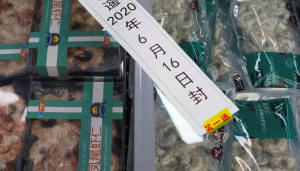The State Administration for Market Regulation will stop testing chilled and frozen foods for COVID-19 from January 8. It will also no longer require all imported chilled and frozen foods to enter centralised warehouses for disinfection and testing before they reach the domestic market. Reuters reported on Friday, 30 December 2022 that China’s meat trade cheered the imminent end of testing and disinfecting chilled and frozen foods for COVID-19, more than two years after Beijing started the controversial practice, adding substantial costs to the trade.

The dropping of measures follows a similar announcement from the customs authority on Wednesday that it will stop testing cold-chain food arriving at the country’s ports. China started testing chilled and frozen food imports for COVID in 2020 after an outbreak of the disease in a wholesale market led authorities to believe the virus had spread from imported produce.
The practice was controversial with trade partners and significantly slowed the shipment of food to China. Week-long bans have been imposed on exporters from countries including Brazil, Ecuador, Indonesia and Russia after some of their cold-chain products tested positive. In the first six months of 2022, Chinese customs issued remote inspections on 182 cold chain import companies, and suspended 60 businesses from importing into China over contamination fears. (source. SCMP).
In July, authorities in the Chinese coastal city of Xiamen were testing freshly caught fish, crabs and even shrimp for Covid-19 as it goes all out to contain a spiraling outbreak – a policy drawing ridicule online and criticism from experts who say it’s a “waste of resources. Videos of hazmat-suited health workers sticking cotton swabs into the mouths of fish and crabs went viral on Chinese social media, sparking complaints that the country’s zero-Covid policy had gone too far. Since the pandemic, China has relied on mass testing, extensive quarantines and snap lockdowns to stamp out any resurgence of the coronavirus. But the highly infectious Omicron variant has posed a challenge to China’s most stringent anti-Covid measures.
In July, it was reported that China’s health authority has rolled back regulations around testing certain imported foods for the COVID-19 virus, in a move aimed at reducing the cost of its strict pandemic measures. China will continue to test chilled and frozen food as it rolls back testing on ambient products.
China began testing the packaging of chilled and frozen food imports for the virus in June 2020, after a cluster of infections among workers at a wholesale food market in Beijing. Six months later, Beijing recommended testing on ambient products too, even as scientists said the risk of coronavirus infection through contact with contaminated surfaces was low.
Now, local governments no longer need to test ambient foods or other goods for the virus, the National Health Commission (NHC) said on its website, but it was not clear if the products would still be subject to checks at customs. Chilled and frozen foods will continue to be tested, however, but exporters will not face import suspensions when their goods test positive at customs checks. The steps come amid growing efforts to support China’s flagging economy.
The biggest impact on these testing for the virus on seafood was on shrimp from Ecuador. Seafood Source in January 2021 said that exports to China were heavily disrupted when Chinese officials announced the discovery of COVID-19 on shrimp packaging from Ecuador, leading China to issue a complete ban on shrimp from three separate companies. While the two countries later managed to work out some of the issues through diplomatic and technical negotiations, the ban still had an impact. In a July 2021 report, Ecuador’s National Chamber of Aquaculture (CNA) Executive President José Antonio Camposano said that Ecuador was forced to find new markets and it did uccessfully. Ecuador sent more product to the U.S. and gaining market share there, and maintaining the leadership in Europe.




